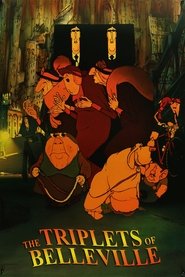I'm loving A. O. Scott's deadpan delivery in his New York Times review: "It is possible to detect, in his view of the fleshy Bellevilleans, a whiff of Gallic disdain for the gigantism of American culture." Indeed, I wonder how much of the drive to reclaim French culture that's evident throughout this film can be attributed to the dominance of Lance Armstrong in the TdF and the Iraq War.
Anton Levay, founder of the Church of Satan, would often point out, in a manner that indicated a humorous appreciation for such things, that if one wanted to search out devilish inspiration in music, one need not look to heavy metal but rather to the “old timey” songs and performers with their eerie, phantasmal overtones of disconnection. The Triplets belong to another time and place, another city of Belleville, and they are indeed disconnected but still alive and vibrant. Obsessed with performance, the Triplets make music where there is none, using the materials they find around them, from treasured refrigerators and newspapers to their own bodies, to make rhythms like old witches casting spells.
— Josh Vasquez & Ed Gonzalez (Slant Magazine)
It's one of those movies where you keep banging your fist against your head to stop yourself from using the word meets, as in Monsieur Hulot meets Tim Burton, or the Marquis de Sade meets Lance Armstrong.
I have to read the mouse-like mafia technician as Mickey Mouse. For me, the HOLLYFOOD photo nails the connection, and the ear covers are pretty convincing too.
— Jay Scott (Satirist.org)
The fact Bruno dislikes trains so much started with the fact that the child’s attention was directed at his toy trains, and then the toy train running over his tail catalyzed his hatred of trains.
— Alexis Atherton (Satirist.org)

